

Cardiff uni study looks at coffee cup fee to cut single use. Disposable coffee cup usage could be cut dramatically if charges were brought in with incentives to promote re-usable cups, according to Cardiff University research.
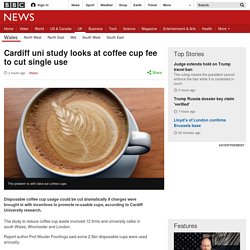
The study to reduce coffee cup waste involved 12 firms and university cafes in south Wales, Winchester and London. Report author Prof Wouter Poortinga said some 2.5bn disposable cups were used annually. The findings are due to be submitted to a UK government inquiry into waste. Poundland to start selling clothing – but for more than £1. Brexit and price hikes push up the cost of Christmas for Britons. BBC helpline sees 26,000 people seek domestic abuse advice. Almost 26,000 people sought advice about domestic abuse from the BBC over the phone and online in 2016, driven by a gripping storyline on The Archers and the BBC1 documentary Behind Closed Doors.
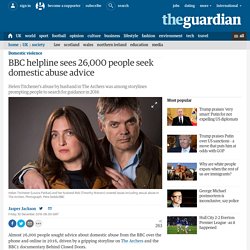
Helen Titchener’s abuse by husband Rob in The Archers also covered issues including sexual abuse, emotional distress and self-harm, and culminated in her being acquitted of attempted murder. Paris Agreement. The agreement sets out a global action plan to put the world on track to avoid dangerous climate change by limiting global warming to well below 2°C.
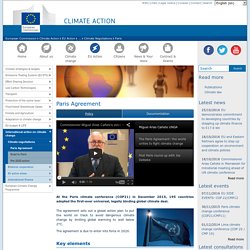
The agreement is due to enter into force in 2020. Key elements The Paris Agreement is a bridge between today's policies and climate-neutrality before the end of the century. Mitigation: reducing emissions Governments agreed. Switzerland votes against strict timetable for nuclear power phaseout. Image copyright Reuters People in Switzerland voting in a referendum have rejected a proposal to introduce a strict timetable for phasing out nuclear power.

A projection for SRF public television showed the initiative failing by 55% to 45%. A majority of cantons (Swiss states) voted against the initiative. The plan, backed by the Green Party, would have meant closing three of Switzerland's five nuclear plants next year, with the last shutting in 2029. The five plants currently generate almost 40% of Switzerland's electricity. After the Fukushima nuclear disaster in Japan, the Swiss government said it would gradually move the country towards renewable energy by 2050. Heathrow third runway 'to breach climate change laws' Image copyright PA Plans to expand Heathrow Airport are set to breach the government’s climate change laws, advisers have warned.
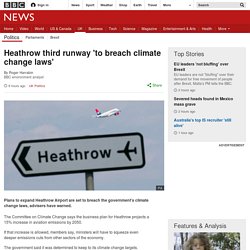
The Committee on Climate Change says the business plan for Heathrow projects a 15% increase in aviation emissions by 2050. If that increase is allowed, members say, ministers will have to squeeze even deeper emissions cuts from other sectors of the economy. From climate change to jihad: U.S. recognizes security importance of battling global warming. On Wednesday, President Obama took another step toward securing his climate legacy.
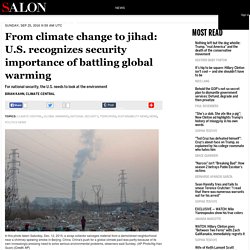
This time his focus wasn’t on energy, public lands or international diplomacy. It was on national security and making sure the U.S. military is prepared for a more unstable future. The White House published a presidential memorandum setting up a timetable for more than 20 federal agencies to come up with a plan to put climate science into action when it comes to national security.
HomeBiogas - Turn Your Waste into Energy. North Korea conducts 'fifth and biggest nuclear test' Image copyright AP North Korea says it has successfully carried out its fifth nuclear test.

The announcement on state media came hours after a seismic event was detected near its nuclear test site. South Korea believes it is the North's biggest ever test, raising fears the state has made real nuclear advances. South Korean President Park Geun-hye called it an act of "self-destruction" showing the "maniacal recklessness" of leader Kim Jong-un. How Large-Scale Urbanization Changes The Future Of Food. Sustainable urbanization isn’t a term that rolls off the tongue.
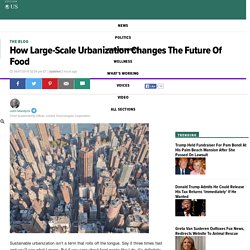
Say it three times fast and you’ll see what I mean. But if you care about food waste like I do, it’s definitely a term you should know. Sustainable urbanization is so intimately tied to food waste that you can’t talk about one without the other. If we don’t get it right, we might miss the most sustainable opportunity to feed our growing planet. In fact, getting the food we already grow and produce today onto people’s plates instead of the one-third or more that’s lost or thrown away could feed everyone that suffers from hunger.
EU hits energy reduction target six years early. Europe has met a landmark goal of slashing its energy consumption six years ahead of time, cutting greenhouse gas emissions equivalent to switching off about 400 power stations.

In 2014, the EU’s 28 member countries consumed 72m tonnes of oil equivalent less than had been projected for 2020, according to a report by the EU’s science arm, the Joint Research Centre (JRC). The figure matches Finland’s annual energy use. Blockchain technology trialled to tackle slavery in the fishing industry. A new digital technology has been trialled to track fish from trawler to the supermarket in a breakthrough that could help stop human rights abuses and illegal fishing.
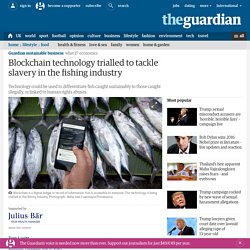
The technology – called blockchain and first used to power the currency Bitcoin – is expected to revolutionise the finance, property and food sectors replacing traditional contracts, paperwork and identification methods. Blockchain is a digital ledger or record of information that is accessible to everyone. In this case it details the origins of fish and allows anyone to see where the fish was caught, processed and sold on. It does not stop illegal fishing on its own but it opens up the supply chain for anyone to scrutinise. With the seafood industry notorious for human rights abuses and illegal fishing, campaigners hope the technology, piloted by a UK-based company Provenance, could help retailers, manufacturers and restaurants prove the origins of their fish.